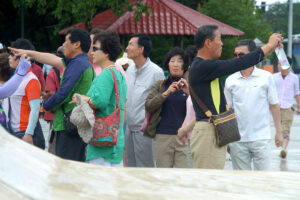THE Federation of Filipino-Chinese Chambers of Commerce and Industry, Inc. (FFCCCII) called for relaxed visa requirements for Chinese visitors and reforms to modernize agriculture and improve the ease of doing business.
“In light of the recent government decision to end all POGO (Philippine Offshore Gaming Operators) operations, (the FFCCCII) expressed hope for relaxed visa approvals for Chinese tourists,” FFCCCII President Cecilio K. Pedro said.
He said within ASEAN, Thailand, Singapore, and Malaysia already offer visa-free entry, while others offer visa-upon-arrival arrangements for Chinese tourists.
“(These give) them a competitive edge in attracting visitors and investors,” Mr. Pedro said.
Earlier this year, the Department of Tourism said visa policies dampened tourist arrivals from China last year.
To modernize agriculture, Mr. Pedro called for mechanized farming, lower power rates, and streamlined bureaucratic processes to improve business efficiency.
Mr. Pedro expressed support for the consultative approach to raising wages through the tripartite wage council involving government, labor, and management, rather then the proposed P200 minimum wage hike.
Tourist arrivals from China totaled 312,222 in 2024, well below the pre-pandemic level of 1.74 million in 2019.
Cebu Mandaue Filipino-Chinese Chamber of Commerce President Justin Uy cited the need to enhance global competitiveness not only in tourism, but also in services, exports, and various industries.
“ASEAN neighbors like Thailand, Malaysia, Indonesia, Vietnam, and Cambodia are rapidly advancing,” Mr. Uy said, highlighting the need “to focus on national unity and dynamic socio-economic reforms to keep pace.”
He also noted the excessive number of holidays in the Philippines, which have led to supply disruptions and 4,000 job losses in Cebu’s garment industry when some factories closed operations. — Justine Irish D. Tabile
